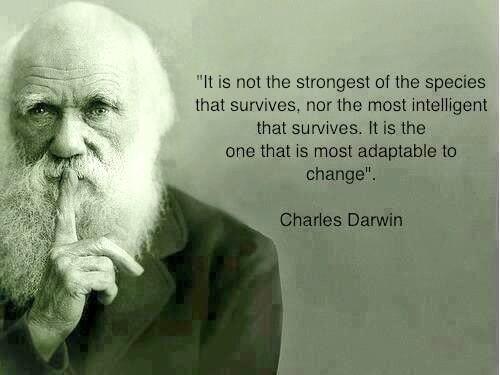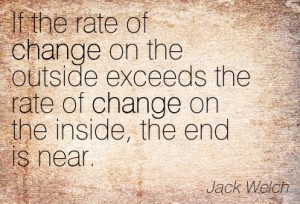I recently delivered a Change Management workshop for a variety of leaders from a variety of industries.
As usual at the beginning of the session I asked the group how many of them were currently going through a change at their workplace.
About 75%.
I then asked who amongst those that were currently not going through change, have had a recent experience.
Predictably the other 25%.
This was great. Change is constant in an organisation and I had the right people in the room who were all involved somehow in contributing to the success of the implementation.
Then I asked the next question:
How many of you feel your change project was or is going well?
 Silence – Not one.
A quick analysis of what was the major causes of the problems highlighted the usual suspects.
- Not planned well
- Too quick
- Too slow
- Lack of communication
And of course the majority seemed to be: People’s resistance.
In 2008, a McKinsey survey executives around the world found, as John Kotter did in 1996, that only one transformation in three succeeds. With all the research, models and theories that have emerged in this area over the recent years it seems it hasn’t translated into more success.
Implement change too quickly without proper planning and you’ll surely fail without effectively preparing the organisational culture, strategies, processes and systems.
Implement change too slowly and you run the risk of implementing solutions for  problems that no longer exist or the solution is obsolete.
In a fast paced changing world we need to be continuously learning in order to keep up.
If we don’t seek to know what we don’t know, we’ll never know what we need to know.
Any change will then be reactive. Being a follower in a competitive market place means you’re only ever going to be working hard at just keeping up with the pack. Running the risk of quick, poorly planned change that never quite gets implemented successfully.
What we know now is not sufficient – the ability of an organisation to keep learning enables it to keep up with changes in the world.
When we seek learning we can discover something new. Something that can inspire a new vision. A vision that expands our thinking of what’s possible and encourages us to be innovative. This innovation can help your business be a market leader and create a real and sustainable competitive advantage.
When we get excited about a vision, we want to share it. You go back to work excited, you can’t wait to share your idea and start working on it. You present a case to the executive board and they agree. All systems go!
The Change Process
It’s been said that good planning prevents poor performance. However with all that we have learnt about managing change, many organisations still implement too quickly without first establishing an effective plan. Learn what needs to be part of the plan. Discover John Kotter’s 8 step model. There are many effective planning models out there.
Here are some of my key tips:
1. Get the early adopters and those excited to make change happen to help you with planning and implementation.
2. Structure the organisation to complement the new changes.
3. Communicate the change story often. Ensure that everybody’s perceptions of what the delivery of the change will be is managed so that people receive what they believe is being promised.
4. Training helps people take the change seriously. Implement effective training using adult learning principles and the 70:20:10 model. Make it a priority, building the skills and talents needed within the organisation to perform the desired change.
5. In order for the organisation to change the people need to change – do differently. For that to happen we need to focus on changing people’s thoughts and emotions to sustain real behavioural changes.
6. Leaders are people too. Ensure your leaders believe in the change so that they can encourage changes in their team. Include them in training programs so that they can help coach their team perform the changes that are needed
Learn what it takes to manage change successfully. Take a course – do it properly. Learn how to help people to adapt to change here
Leading change by seeking to know what you don’t know will make sure your organisation continues to be successful, keeping pace with the changes in your business environment.
Help your team think more creatively and encourage innovation. Learn how to foster this here
People at their core want change. Positive, genuine change with a purpose. They want to dedicate their time to achieving success and to really make a difference.
Help them do it.






Leave A Comment